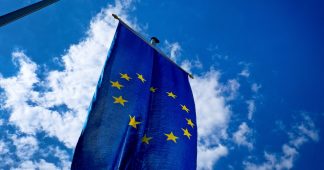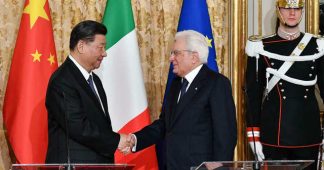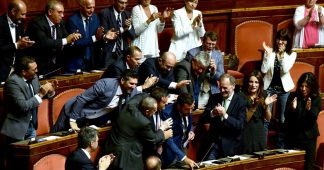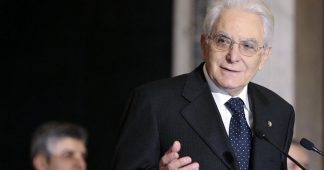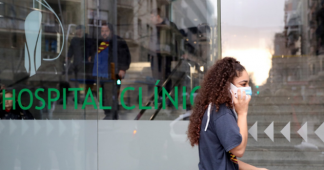Push by Italy and Spain for new financial instruments faces resistance from Germany and the Netherlands.
The summit was virtual; the anger and disagreement among EU leaders was very real.
For Italy, the test of EU solidarity in responding to the coronavirus crisis came down to a simple point: Your bond is your word.
But EU heads of state and government failed Rome’s test during a videoconference on Thursday by refusing to back the idea of “corona bonds” — a common debt instrument to help finance the response to the coronavirus pandemic, which has claimed thousands of lives across Europe in recent weeks and put the Continent on virtual lockdown.
The dispute took EU leaders to the edge of a political debacle, with a complete breakdown averted only through an agreement brokered by European Council President Charles Michel for leaders to return to the debate in two weeks, when they will consider formal proposals from eurozone finance ministers.
Still, the leaders’ meeting, which was intended to showcase the bloc’s unity, instead highlighted bitter divisions, fueled by lingering resentment over the handling of the eurozone debt crisis a decade ago, and by more recent and raw fury over the initial unwillingness of other EU capitals to come to Italy’s aid with medical equipment.
Italian Prime Minister Giuseppe Conte, furious about adamant opposition to the corona bonds concept by the Netherlands and Germany, upended the videoconference by declaring that he would not support the leaders’ concluding statement.
“We need to react with innovative financial tools,” Conte told his counterparts, according to an Italian official. Conte issued an ultimatum giving officials in Brussels 10 days to come back with “an adequate solution.”
Spanish Prime Minister Pedro Sánchez weighed in to support Italy, aligning the two countries that have suffered the most coronavirus deaths.
“If we don’t propose now a unified, powerful and effective response to this economic crisis, not only the impact will be tougher, but its effects will last longer and we will be putting at risk the entire European project,” Sánchez said, according to a statement issued by his office. “The same mistakes of the financial crisis of 2008 — which sowed the seeds of disaffection and division with the European project, and provoked the rise of populism — cannot be made. We must learn that lesson.”
As a result of the interventions by Conte and Sánchez, which one senior EU official called “emotional,” the videoconference dragged on three hours longer than expected as Michel worked frantically to preserve the joint statement. Ultimately, he succeeded with a series of tweaks that only officials highly-attuned to Brussels bureaucratese could understand.
In one paragraph, for example, a call for a “proposal” from the Eurogroup finance ministers became a call for “proposals” plural — a change that in the view of the Italians means that the corona bonds are still on the table.
Officials and diplomats said Michel had convinced Conte and Sánchez to stay on board in part by focusing on a closing paragraph in the joint statement that focused on looking ahead toward recovery from the crisis.
‘We should however start to prepare the measures necessary to get back to a normal functioning of our societies and economies and to sustainable growth,” it says. “This will require a coordinated exit strategy, a comprehensive recovery plan and unprecedented investment. We invite the President of the Commission and the President of the European Council, in consultation with other institutions, especially the [European Central Bank] ECB, to start work on a Roadmap accompanied by an Action Plan to this end.”
The fight over financing instruments overshadowed an array of other steps that EU leaders have taken in recent weeks to strengthen the overall response to the pandemic, including new joint procurement measures for essential medical equipment; a 30-day ban on non-essential travelers from outside the EU; and better coordination over internal border restrictions.
After a rocky start, EU countries are not only helping each other obtain necessary equipment, but in some cases even welcoming sick patients across borders.
Read more at https://www.politico.eu/article/virtual-summit-real-acrimony-eu-leaders-clash-over-corona-bonds/
